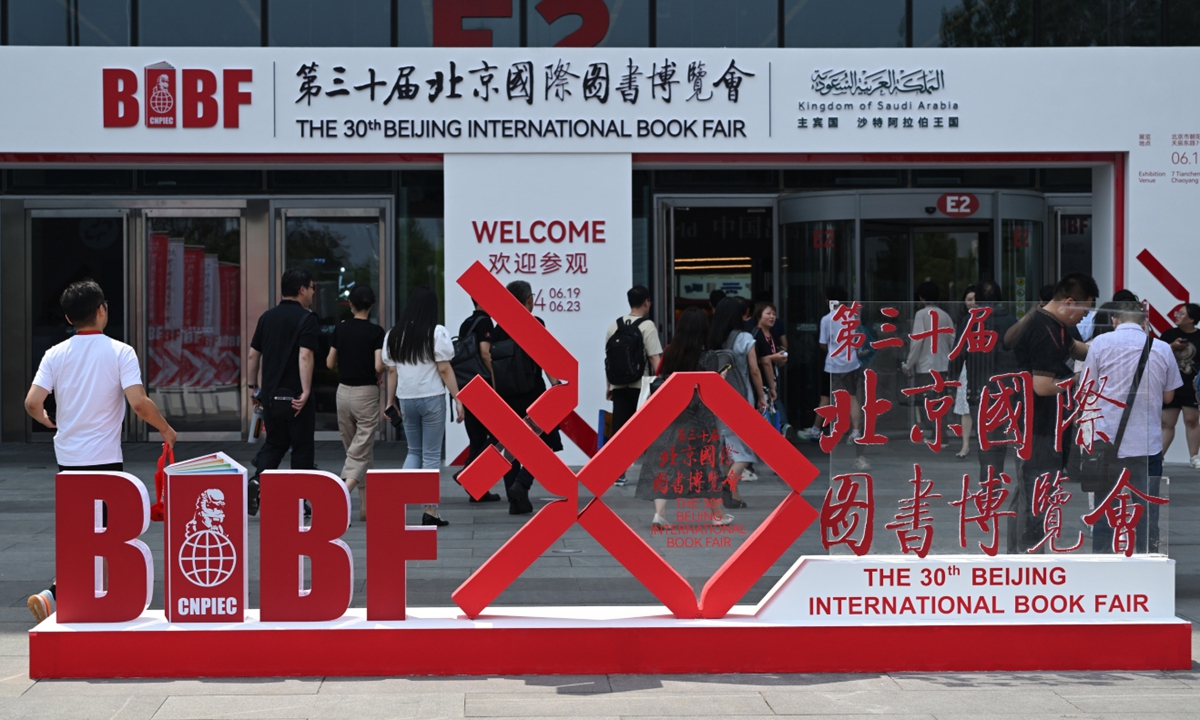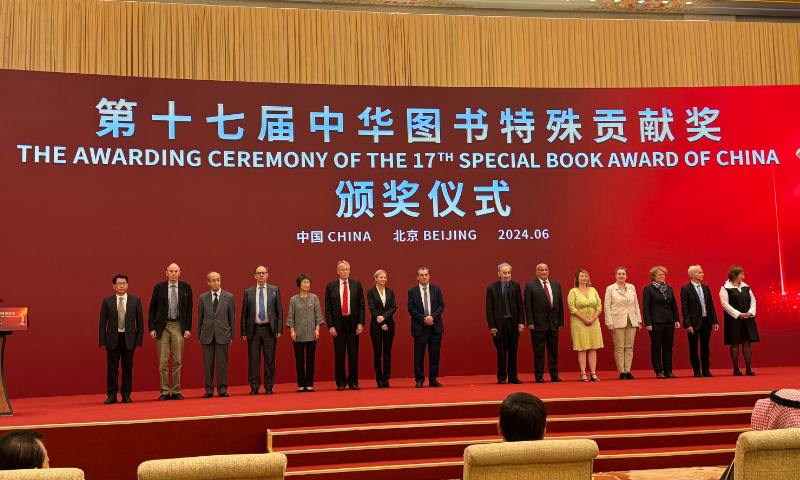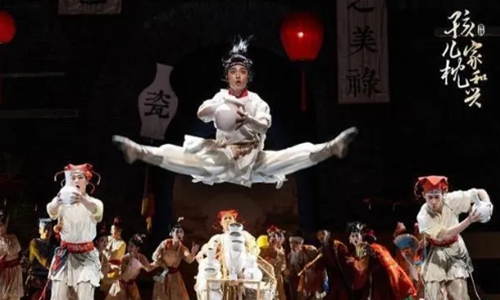Traditional culture enriches choices of reading content for Gen Z
In-depth understanding of classics
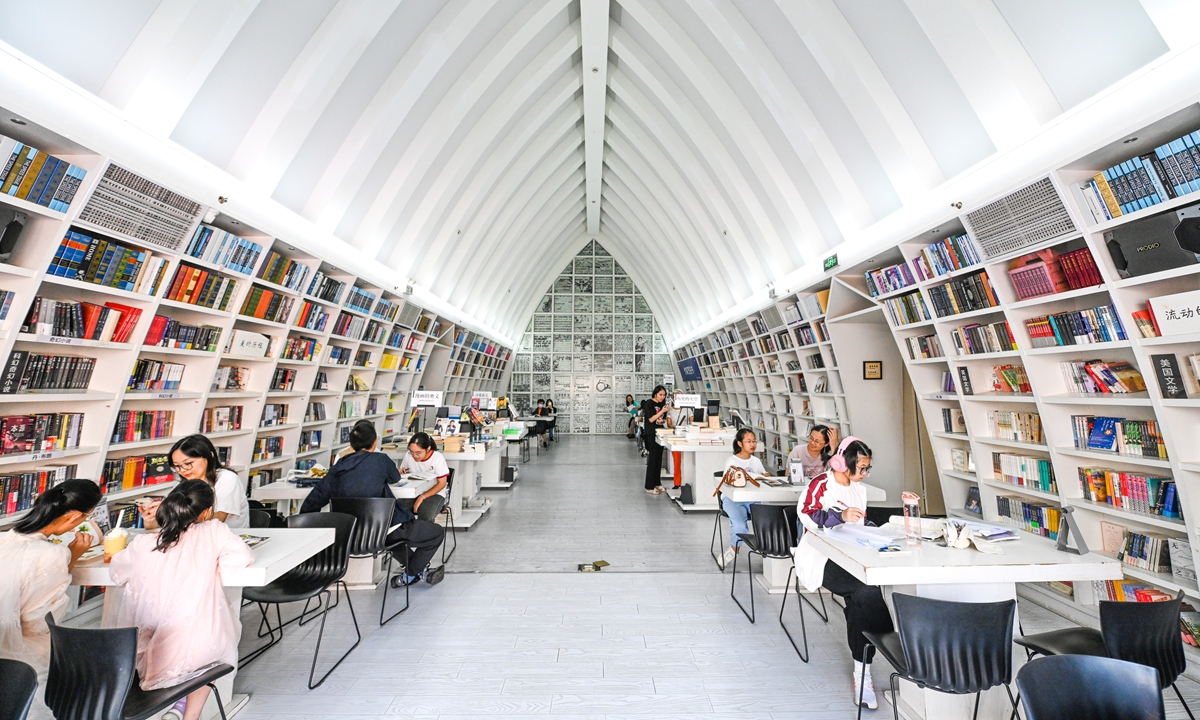
People read books in a bookstore. Photo: VCG
The New Tao Te Ching, A Modern Reader, was recently published by SDX Joint Publishing Company, which is commonly known as Sanlian Press. This is the latest masterpiece by compiler Qian Ning, who published The New Analects: Confucius Reconstructed, A Modern Reader. Keeping China's Generation Z's craving for Chinese classics in mind, the publishing sector and scholars are stepping up efforts to offer more options on bookshelves. Qian told the Global Times that the Chinese readers need to deepen the understanding to Chinese classics.To help the Chinese leaders understand the philosophy logic in the Tao Te Ching, Qian has got the Chinese classic reconstructed and rearranged the text thematically. The New Tao Te Ching, a reconstructed version, has elaborated the original 5,000 characters with brand new text. Each sentence is displayed in three parts: notes, translations from ancient Chinese to contemporary Chinese and comments.
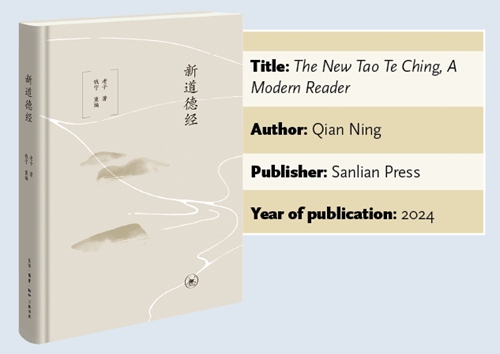
Innovative structure
When reading the Tao Te Ching, Qian found that the classic has its own double logic lines in expressions. As a result, its flow of text formed its unique dual expressions with many threads. Even though the Tao Te Ching is one of the most translated Chinese classics, modern readers might not follow the multiple threads in the book and find it rather difficult to understand the staggered logic and underlying meaning.
Based on this observation, Qian decided to compile new version and the staggered logic style has been combed into two major logic lines in expression. In each session, the text first answers the question of what Tao is; next, it discusses how people should behave, following the Tao. In this new structure, the new book consists of two parts - the Tao edition and virtue edition.
Qian said that he would like to provide his audience with a modern reading of the Tao Te Ching. "Due to historical reasons, many [Chinese] classics are not easy to understand, such as the Analects, in which the chapters were somehow unsorted. While the Tao Te Ching has once been regarded as lacking readability, in effect all these classics have their own main logic and structures."
The new book provides more intuitive content and better sequence without any change in the original text, Qian said. "Of course, in the process of recompilation, I have to respect the original text in its theme and coherence and I also need to provide reliable text, making sure the elaboration coming from founded basis.
In addressing the aspiration, Li Jingtao, editor of this book, told the Global Times that producing the New Tao Te Ching, A Modern Reader, was a response to readers' demands.
"Compared to the time when the Chinese classics were written, the readers' mind-set for reaching and thinking has changed fundamentally in modern times. Given such changes, in addition to Chinese readers' desire to pursue their cultural roots, a new edition was called for," said Li.
New interpretation
With each generation living in their own social context, Qian told the Global Times that the new generations of Chinese will have their own new understanding and interpretation of traditional Chinese culture.
"We are not simply going back to the Chinese classics, rather we are starting again from these classics," he stressed.
When we share our cultural heritage with the international peers, we need to have a deeper understanding of our own classics, Qian said.
Based on a deepened understanding of Chinese classics, younger generations will be better positioned when it comes to cultural self-confidence.
"As ancient Chinese philosopher Lao Tzu put it, 'The movement of the Tao [is] by contraries proceeds,'" and its meaning includes coming back, and change, Qian elaborated.
Through starting from the classics, we can improve our own knowledge and understanding of the classics. Whether it is Confucius or Lao Tzu, there is a profundity in their ideas that our generation has not yet truly comprehended. To re-read the Chinese classics, we must be able to understand the meaning between the lines. Therefore, we cannot simply complain that Westerners have a "superficial" understanding of Eastern culture. In fact, our own understanding is not deep enough, he added.
Youthful readership
It is interesting to see more Gen Zers have a strong demand for what is known as "Guochao," or "China chic." The literature market is no exception.
In addition to Confucius and Lao Tzu, many concepts from China's great philosophers, such as Wang Yangming (1472-1529), are still relevant to these readers.
Browsing mobile apps, including Xiaohongshu and Toutiao, Chinese classic books are among total searched items, and some readers are learning about the ancient people's lifestyle, reading list, diet and medical books. Toutiao created a dedicated channel for Chinese classic books, where readers can explore books in both simplified and traditional Chinese characters.
Li told the Global Times that each time when her team plans to find a new book, they need to research current trends across Generation Z.
"In this new era of China's rapid development, Gen Zers are experiencing different times. The social environment, and even the way of feeling the world and reality is very different from those of the previous generations," Li said.
Only by understanding the way of thinking, the way of obtaining information and the way of expressing information, their reading habits and preferences, and their new understanding of the relationship between the world and China can we fulfill the mission of publishing industry communication in a targeted approach, she stressed.
Many readers belonging to Generation Z have been trained in basic Chinese studies from an early age, which is parallel and complementary to Western-style education methods.
Against this backdrop, China's economic, social and cultural development has also made these young people naturally proud, and they have a strong sense of attachment and interest in classic works linked to traditional culture. Today there is a growing popularity for Chinese studies, archaeology, poetry and traditional classics all belong to the immaterial and cultural aspects of the national tide, Li stated.
From her point of view, even though publishing, a modern industry, is a kind of commercial pursuit, it is also a condensation of human factors including the industry, authors and readers. "Publishers should achieve dialogue and communication between people through the text, the collision and enlightenment of the mind. This is a stable thing full of human factors that does not fade away in times full of uncertainties," she said.
Conversation through thousand years
Qian graduated from the Renmin University of China with his bachelor and master's degrees in literature. He worked as a reporter for the People's Daily from 1986 to 1989 and was a Michigan Journalism Fellow (the University of Michigan) in 1989-1990.
His most famous book is Chinese Students Encounter America, a bestseller in China (1996 and 2002 in English published by the University of Washington Press). He is also the author of Confucius: The Sage on the Road, and a novel about Li Si, the Qin dynasty prime minister.
When he completed compiling The New Analects: Confucius Reconstructed, A Modern Reader, he visited the birthplace of Confucius in Qufu, East China's Shandong Province. This time, when he finished working on the New Tao Te Ching, A Modern Reader, Qian visited Luyi county, Central China's Henan Province, the verified birthplace of Lao Tzu.
"When I graduated from university, I went to Qufu for the first time. At that time, I really didn't expect that 30 years later, I would write a novel about Confucius and recompile the New Analects." Qian said.
Qian had not been to Luyi before. However, before the publication of the New Tao Te Ching, A Modern Reader, he visited the remote county.
"Luyi is not yet connected to railway, so I needed to transfer many times on my way. It is a simple small town, and it is amazing to think that more than 2,000 years ago there was a wise man like Lao Tzu here. Standing in front of the Laojuntai [Lao Jun platform], which is said to be the place Lao Tzu have risen to become an immortal, you can feel the peculiar atmosphere. Of course, you can also hear many magical legends about Lao Tzu, too," said Qian.
